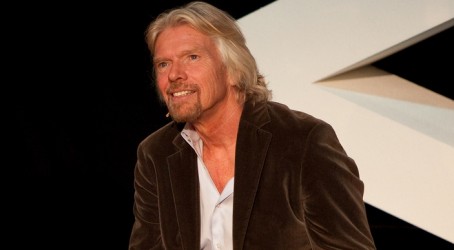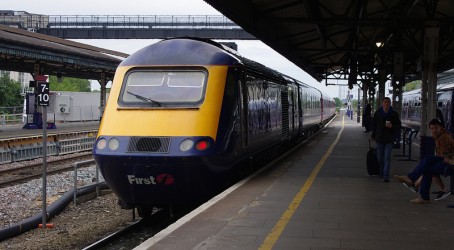The cancelling of the controversial West Coast mainline franchise award was “wholly and squarely” down to a Whitehall fault, transport secretary Patrick McLoughlin said today.
There will be a £40 million cost to taxpayers for the scrapping of the process which would have meant Sir Richard Branson's company Virgin Rail losing its West Coast contract to rival transport company FirstGroup.
McLoughlin pulled the plug on the whole process early this morning, saying “unacceptable mistakes” were made by the Department for Transport (DfT) in the way it managed the franchise bids from FirstGroup, Virgin and two other companies.
Describing the bidding process as “flawed” and “insane”, Sir Richard had launched a legal challenge to the FirstGroup decision.
Having intended to contest the challenge, McLoughlin is now dropping his opposition, cancelling the West Coast franchise competition and ordering two independent inquiries into what went wrong with the West Coast process.
Speaking today, McLoughlin said he was “very angry” about what had happened.
He went on: “The original model didn't take into account inflation and also some elements of the passenger number increases over a number of years,” he said.
“I want to make it absolutely clear that neither FirstGroup nor Virgin did anything wrong. The fault of this lies wholly and squarely with the DfT. Both of those two companies acted properly on the advice that they were getting from the Department.”
McLoughlin has put on “pause” the bidding process for three other rail franchises.
He told the BBC Radio 4 Today programme: “I want to make sure what lessons need to be learnt from what went wrong with this have not been repeated in those particular franchises.”
Asked how much it would cost to reimburse the costs of the four companies who entered into the bidding process, he replied: “We estimate that to be in the region of about £40 million.”
He went on: “I'm not going to apologise for the terrible mistake that has been made by the Department. We need to get to the bottom of what went wrong as far as that is concerned.”
He revealed that he had spoken to the parties involved last night, including Sir Richard, saying that what had been found was “deeply regrettable”.
An announcement is expected to be made later today about the suspension of government staff while investigations are carried out.
Virgin has run the West Coast line since 1997, more than doubling annual passenger levels and introducing high-speed tilting Pendolino trains on the London to Scotland route.
Sir Richard, who had questioned FirstGroup's ability to live up to its franchise promises for the whole length of the 13-year 4-month contract, welcomed McLoughlin's decision today and said he was hopeful that Virgin would carry on running the franchise.
FirstGroup said it was “extremely disappointed” at the news, adding that it had submitted “a strong bid, in good faith and in strict accordance with the DfT's terms”.

Full statements from Virgin and FirstGroup after the Department for Transport's decision to cancel the West Coast franchise competition:
Virgin
“We welcome today's frank announcement by the secretary of state, acknowledging the flaws in the way the InterCity West Coast competition was assessed and launching a review into franchising more widely.
“We are ready to play a full part in assisting the review to help deliver a franchising system that better serves passengers, taxpayers and the interests of all bidders.
“In the meantime, we will assist the Department for Transport in ensuring continuity of service for the millions of customers who depend on train services on the West Coast mainline.”
Here is Sir Richard Branson's full blog post, put on the Virgin website:
“I took a call this evening in New York from the UK Secretary of State for Transport, Patrick McLoughlin, telling me that he will no longer be awarding the West Coast Main Line franchise to FirstGroup.
“From the moment we found out that FirstGroup had been made the preferred bidder with a completely unrealistic bid, we questioned the way the offers had been assessed, and asked the Government to review and explain how it came to its decision.“We were convinced the process was flawed but despite our best efforts we were met with silence by the Department for Transport.
“We also asked for the Government to appoint an independent advisor to look at the situation, which was turned down.
“Reluctantly we were forced to seek a judicial review. Tomorrow the DfT were meant to have given their evidence to the court.
“I am pleased to say that the DfT has looked at all of the facts and found significant flaws in the way it's officials handled the process.
“They have basically acknowledged that what we had been saying is correct.
“The same procedures were not followed and 'deeply regrettable and completely unacceptable mistakes' were made by the Department.
“At the House of Commons Select Committee we called for all franchise competitions to be paused and a thorough, independent review of the process. We are grateful that Patrick McLoughlin is now doing this.
“We also appreciate the DfT publicly acknowledging these errors, and are hopeful they will now accept that Virgin Trains should carry on running the West Coast Main Line and ensure that passengers continue receiving our team's award-winning service.
“Finally, I would like to thank our staff for their incredible work through unsettling times and to all our passengers who have been so supportive.
“I would particularly like to thank those who signed Ross McKillop's e-petition that resulted in the House of Commons debate, and all those who believed that we were right in thinking there was a case to answer.”

FirstGroup
“We were notified late last night that the Department for Transport (DfT) has apparently discovered significant technical flaws in the way its franchise process for the InterCity West Coast was conducted and has consequently cancelled the competition for this franchise.
“We understand the DfT has ordered two urgent independent inquiries into the West Coast competition and the wider DfT rail franchise programme.
“Until this point we had absolutely no indication that there were any issues with the franchise letting process and had received assurances from the DfT that its processes were robust and that it expected to sign the contract with FirstGroup soon.
“We are extremely disappointed to learn this news and await the outcome of the DfT's inquiries.
“The DfT has made it clear to us that we are in no way at fault, having followed the due process correctly.
“We submitted a strong bid, in good faith and in strict accordance with the DfT's terms.
“Our bid would have delivered a better deal for West Coast passengers, the taxpayer and an appropriate return for shareholders.”
PE examines what the government's decision to scrap its West Coast franchise plans means for rail passengers and future rail policy.
Q. Just how embarrassing is all this for the government?
A. Well, it's left ministers and Department for Transport (DfT) officials with a great deal of egg on their faces. Former transport secretary Justine Greening and the incumbent Patrick McLoughlin had been at pains to say that the West Coast bidding process had been robust. Now it transpires it was anything but.
Q. So what exactly has gone wrong?
A. It seems it was not just a matter of the difference between Virgin's bid and that of FirstGroup but that all the bids from all four competing companies were not properly evaluated by officials. Heads could roll at the DfT while the government's general competence, at a time it is trailing in the polls, has been called into question.
Q. So what happens now?
A. There are two reviews to look into what happened and, until they report, the bidding process for three other rail franchises has been put on hold. A number of other franchises are due for renewal over the next few years and this lengthy process could be spun out even further now, leading to uncertainty at a time of ever-increasing passenger numbers on the network.
Q. What about the West Coast and its passengers?
A. Passengers should have nothing to worry about. Possibly, Virgin will be asked to carry on running the trains after the December 9 date on which FirstGroup had been supposed to take over the line.
In any case there is a legal provision for the DfT, if necessary, to take over franchises and run them in the public sector. The department has been doing this since 2009 on the East Coast main line after National Express pulled out of the franchise.
Q. What other implications are there?
A. At least McLoughlin comes out of the debacle relatively unscathed, even if he initially embraced the original DfT West Coast decision made under Ms Greening.
McLoughlin can say that the errors occurred before his arrival at the DfT, while Greening, now International Development Secretary, must bear the brunt of the criticism.
Q. What about government rail policy generally?
A. This fiasco will support the views of some who question what franchises are for. It also plays into the hands of those who say that the government has too much control of what is supposed to be a privatised railway.
Then there is the question of rail running costs, which the government is determined to reduce. Some might argue that in deciding on bids from companies to run franchises, the DfT is more concerned about how much money is being promised than the standard of service likely to be provided.
Q. What about FirstGroup, Virgin and the two other unlucky bidders?
A. They are getting their bid costs back from the DfT at a time when the rail industry can ill-afford to dish out any money. As usual the real losers here will be taxpayers.
Q. So something of an shambles, then?
A. Looks like it.